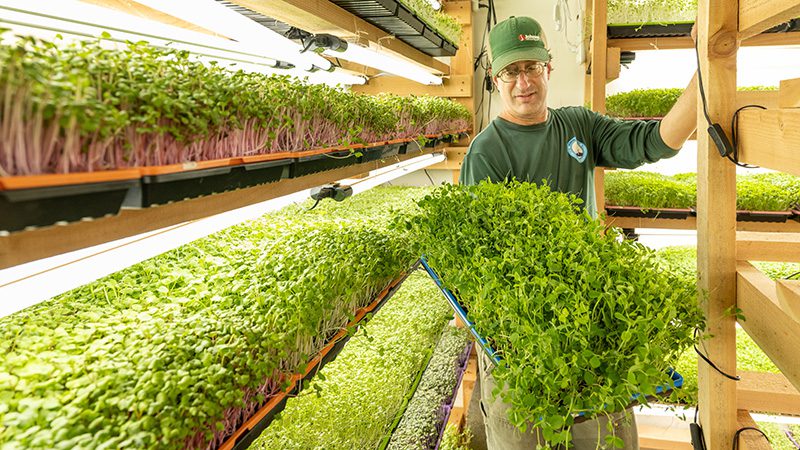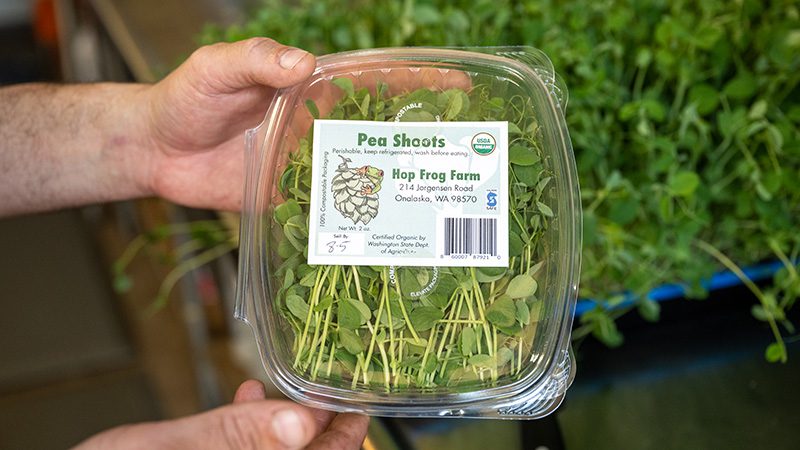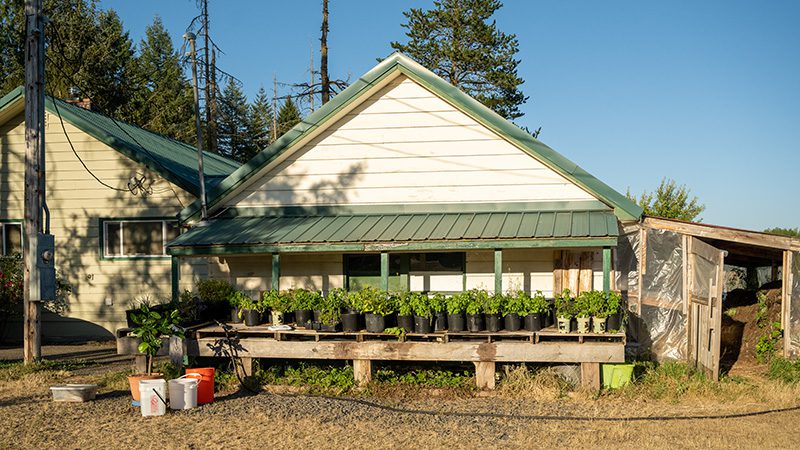Hop Frog Farm’s Microgreens Shape Sustainable Agriculture
This article was originally published in June 2024

At Hop Frog Farm in Onalaska, microgreens are fueling some major environmental change.
The mini-shoots of sunflower, peas, broccoli and other greens from Jordan Cohen’s farm southeast of Olympia are valuable in their own right — tender and packed with nutrients and antioxidants.
Microgreens, essentially plants harvested at an early developmental stage, became popular as so-called “vegetable confetti” at fancy California restaurants in the 1990s. The term is believed to have been coined in 1992. But in recent years, microgreens have been recognized as nutritional powerhouses as well as salad fixings or garnishes, with higher levels of phytochemicals than their full-grown counterparts.
For Hop Frog, the packaging is one key that the farmers are doing something different. The farm’s containers resemble clear plastic clamshells, but they are not: They’re entirely compostable. The label is compostable too, a rarity that required considerable research and raised Cohen’s costs.
The microgreens are certified organic, and they’re Salmon-Safe, a certification that attests the recipient is farming in a way that preserves water quality and habitat for salmon.
Hop Frog’s entire business was built around saving that habitat.

A commitment to conservation
Cohen was an independent contractor doing construction work, and a longtime bartender at The Sloop in Ballard, when he moved out to the rural community. He lived near a bucolic tree-lined tributary of the Chehalis River with an active beaver dam and salmon runs, commuting into Seattle for work shifts.
Then in 2021, he learned that the 220-acre property next door, an organic dairy, was to be sold for residential development.
“I asked the owner, would you be willing to sell me this place instead?”
The neighbor was incredulous, Cohen recalled — but gave him a chance to show he could pull it off. Another farmer in the area told him microgreens were a profitable crop. Really, it was also one of his only options. He didn’t have acreage to work with, “I just had the garage.”
Unlike sprouts, greens are simply infant versions of plants, grown in soil and trimmed above the root after the first cotyledon leaves emerge from seeds.
The tiny greens took off. Cohen approached PCC’s produce merchandisers, who agreed to try them out at the Ballard PCC, where they were well received by shoppers. Eventually, as the business grew the PCC opportunities expanded too. He now delivers microgreens to all 15 PCC stores – sunflower shoots, peas, mixes of tatsoi, kale, broccoli and more.
Sustainable food packaging
As Cohen “went down the rabbit hole” of learning about plastics pollution, he knew “I did not want to contribute” to that problem. Finding reliable sources of compostable packaging that weren’t ruinously expensive was hard enough; finding compostable labels was another level of difficulty — there was only one manufacturer in the United States that was acceptable to the region’s composting facility. His packaging isn’t the cheapest or glossiest, but it feels like a responsible choice.
Hop Frog also provided foraged nettles in the spring to certain PCC stores, and is expanding into abundant fresh basil. In a partnership with Grace Harbor Farms, under the name Sunrise Creamery, Cohen’s working on a dairy business too, starting with cream cheese and planning for yogurt — all with the goal of preserving more land.
Hop Frog’s success helped Cohen meet the requirements for U.S. Department of Agriculture loans to purchase 20 acres of the neighboring property. That purchase paused any immediate plans to sell the remainder, and Cohen’s working with the owner to arrange ways to conserve the rest. He’s working with other agencies, including Washington State University and Ducks Unlimited, a nonprofit devoted to wetlands and waterfowl conservation, to work on habitat restoration and maintaining the riparian areas. New herbs and other crops are growing in greenhouses on the land he now owns.

The bulk of the property is not the best for growing broccoli or raising dairy cows or other standard farming, he said — but it’s perfect for rehabilitating an ecosystem.
Cohen knew something about development when he began the “Hail Mary pass” to save the land; he’d moved to Onalaska after being priced out of Seattle “by people who just want to make money by putting up as many houses as possible.”
Farming was a newer focus. A Chicago native who moved to the Northwest to attend Evergreen State University, his first exposure to growing food came when he lived near the Ballard P-Patch. For the first time, he was able to see how things grew, the interactions between humans and plants and wildlife. A customer at the Sloop, a bartender at the old Lombardi’s restaurant, had a P-Patch plot and told Cohen to eat whatever he liked from it.
“I had never had a fresh fig before in my life,” he said. He began learning about permaculture and volunteering at the Beacon Food Forest.
He likes microgreens just fine, but his true passion is for the bigger picture — using land responsibly and sustainably, studying and saving it. With a grant from the Tilth Alliance, he’ll also be building a composting facility to help prevent nutrients from the farm’s compost from washing into waterways, and further plans to grow more certified organic herbs.
Many people might have raised an alarm about the endangered habitat, far fewer would devote their own lives to a plan with no guarantees of success. It worked because he was willing to take a risk, and able to follow through.
That goes beyond his own farm. Hop Frog has contributed more than $2,100 from PCC sales to Growing for Good, a partnership between PCC, Seattle Neighborhood Farmers Markets and Harvest for Hunger that connects farmers growing fresh produce with local food banks.
“Jordan’s dedication to sustainability and quality, especially evident in his compostable packaging, caught my attention right away,” recalled Elliott Lamoureaux, PCC’s produce merchandiser.
“What sets Jordan apart is his realness. He’s not just in it for the sales; he genuinely cares about making a difference.”
